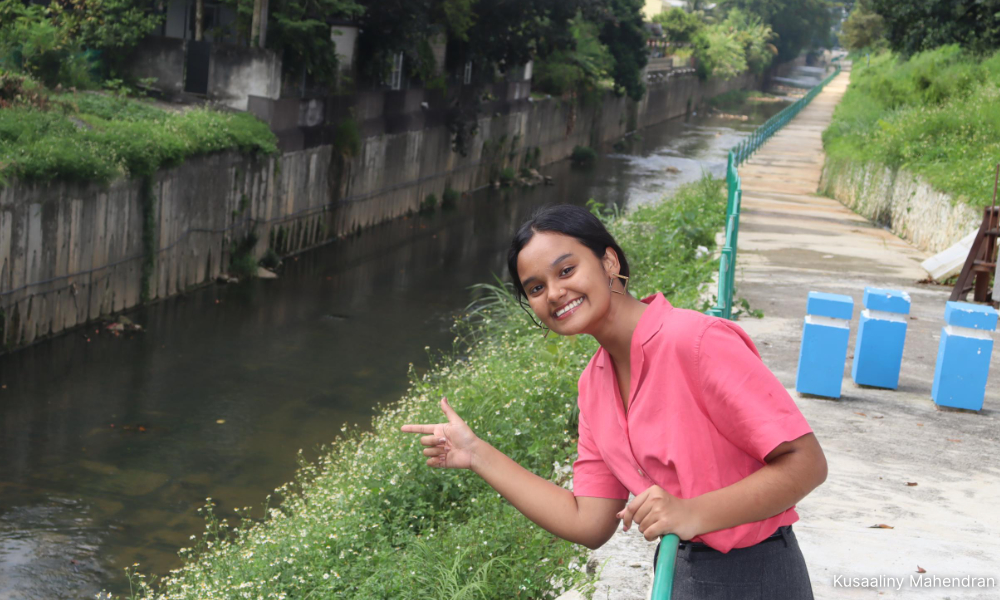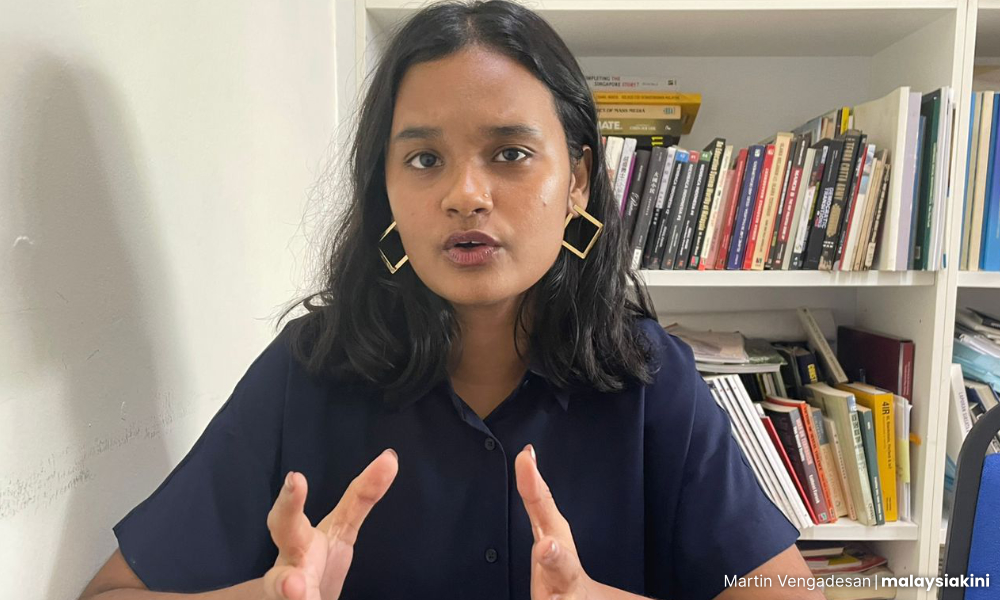INTERVIEW | Having just turned 24, Kusaaliny Mahendran is among the youngest individuals appointed to serve as a Majlis Bandaraya Petaling Jaya (MBPJ) councillor last month.
A graduate of actuarial science from Universiti Tunku Abdul Rahman (UTAR), she is finishing her master’s in public policy at Universiti Malaya.
However, in an interview with Malaysiakini, she said she’s not content to sit back and leave necessary change and reforms in the hands of others.
“People do ask me why I joined politics when the natural expectation of an actuarial science graduate is that they would join the corporate sector and make money.
“But every time I have placed my faith and expectation in someone whom I don’t know at all, they have disappointed me in some way.
“So I believe that instead of waiting around and hoping that someone else will be part of the change that ensures our country’s prosperity reaches the grassroots, it’s time for me to step up and bring the change that I want, said Kusaaliny, who is also DAP Youth chief for the Petaling Jaya division.
Dominance of elite
Speaking in the aftermath of the reduced sentence accorded to convicted felon Najib Abdul Razak, she said it reflected the detachment that the elite can feel from the struggles of the masses, and how helpless common people can feel when there appear to be double standards applied in the country.
“I was filled with rage after Najib’s 12-year sentence was reduced by half. Most voters are law-abiding citizens and to see this sort of injustice shoved in our face, I don’t know how to forgive people that were responsible.
“To me, there has been an important bubble-breaking moment when I realise that power is not with the people at the moment, but with those who win politically and have the connections to publicly brush off the verdicts of the courts.
“Malaysia’s elite class politics is not talked about enough. We talk about race and religion, but not enough about cronyism and nepotism and the old boys’ club. These people continue their reign and seem to do what they want, through ties with politicians, business, royalty and others in the power structure,” she added.
Kusaaliny strongly believed that Malaysians must mobilise themselves and engage in grassroots politics, expressing their aspirations and meeting the needs of those at the bottom of society’s structure.

“Even in DAP, when I started, I had no connections, no angels looking out for me. I have had to bang on doors to be heard.
“I would like to see participation in politics that opens doors for the B40 and M40 to shape their future instead of being told they have to live with the decisions handed down.
“My family graduated from the B40 to the M40 when I was 15, less than 10 years ago. I hope that we can turn things around. I have had enough of being ruled by rich people,” she said.
“Many of us Malaysians are not listening to each other. I think with the grassroots, maybe I can see it with a different lens from a more privileged elected official, as I know what it’s like to have no scholarship or money to study despite getting 10As in SPM,” she added.
She said that even when doing her master’s, she chose the topic of anti-competitive practices in the Malaysian beef industry and was exposed to cartels manipulating prices, which affects the common people.
High expectations in PJ
Born in Kuala Lumpur, Kusaaliny moved to Ipoh at six and returned to the Klang Valley after her SPM. She is the first graduate in her family and acknowledges the sacrifices that have given her the opportunity, even as her father worked his way up from a labourer to a store manager in the retail industry.
“I admit that they don’t like the path I chose since I did well in actuarial science - to see me throw it away in politics is scary for them. But I want to make them proud and show them why I decided to do this,” she said.
An assistant to Bukit Gasing state assemblyperson Rajiv Rishyakaran, she will be serving as councillor for Petaling Jaya’s Section 11, 12 and 13 and is keenly aware that the residents have high expectations.
“I have a two-year term and I don’t want to be someone who just talks.
“In the next two years, I hope our residents can see the difference. I’d like to increase green space in PJ and we have already identified certain areas. I think also that living as a senior citizen in PJ needs to be more comfortable and we want to look into that,” she said.
She cited as highlights a “recycling at source” project and the river trail of 700m along Sungai Penchala from Petaling Jaya's Section 14 to Section 19, which cost RM409,000.

“Extending the river trail from 700m to 3.1km is our plan. We shouldn’t treat the river like a backyard, and we want to get the public involved.
“Recently when one resident spotted an act of pollution they reported it and the offender was summoned. We need to inculcate this sort of community spirit where we take a stake in improving and preserving our surroundings.”
She said that increased security and accessibility for public transport were also essential.
“It’s not just enough to convert car users to public transport which we are trying to do. You also need covered walkways with lighting and secure paths. PJ has low crime rates but that doesn’t mean that we should stop there.
“It was shocking to me that priority was not given to safety and walkability around the LRT stations and with the new Circle line and LRT3 to come, this must be done.
“Petaling Jaya MP Lee Chean Chung is also a strong advocate of public transport and we would like to see the Celcom tower, PJ Sentral area become a real transport hub. We must get it right because we are spending so much on it, and it may make a difference for the next 50 years,” she added
Sitting on town planning, infrastructure, finance and law committees ensures that she has a voice in development and she said that she doesn’t shy away from constructive criticism.
“I think I can differentiate between those who are genuinely frustrated and feel that their voices are not heard and those who use ferocious tones and nasty language.
“My job is to increase participation.
“For example, while Muda says PJ is overdeveloped, they have not submitted objections to any of the section 13 draft and the proposed programmes. MCA at least does and we can discuss it. We are not shutting down opposition,” she said.
Future direction
She conceded that if DAP is to be an agent of change for the nation, it has to accomplish something it hasn’t done since its founding in 1965.
“You could say that with 40 plus seats in largely Chinese majority areas, DAP has maximized its natural base. So in a way, it does need to evolve or change to reach all Malaysians.
“However, I don’t think that merging with any of our partners is the answer either. DAP needs to be represented multi-racially by members and leaders. We need to put up enough effort and open service centres in the areas where we lost, even those we lost badly,” she said.

She acknowledged that despite talking about a multiracial game, DAP’s leadership at federal and state levels is still heavily skewed towards those of Chinese ethnicity.
“Our aim should be to attract new talent and cultivate new teams. It’s not about parachuting Syahredzan (Johan), Rara (Young Syefura Othman) and Syerleena (Abdul Rashid) into seats, but about going into hostile unfamiliar territory and working with the grassroots people there and building talent.
“In our ‘black areas’ like the northern states, the people need a cause and DAP has not given them that.
“It’s also time to look at how we are disappointed with the Indian voters. Maybe it’s time to level up if our current Indian leaders are failing to represent the community,” she said. - Mkini



No comments:
Post a Comment
Note: Only a member of this blog may post a comment.